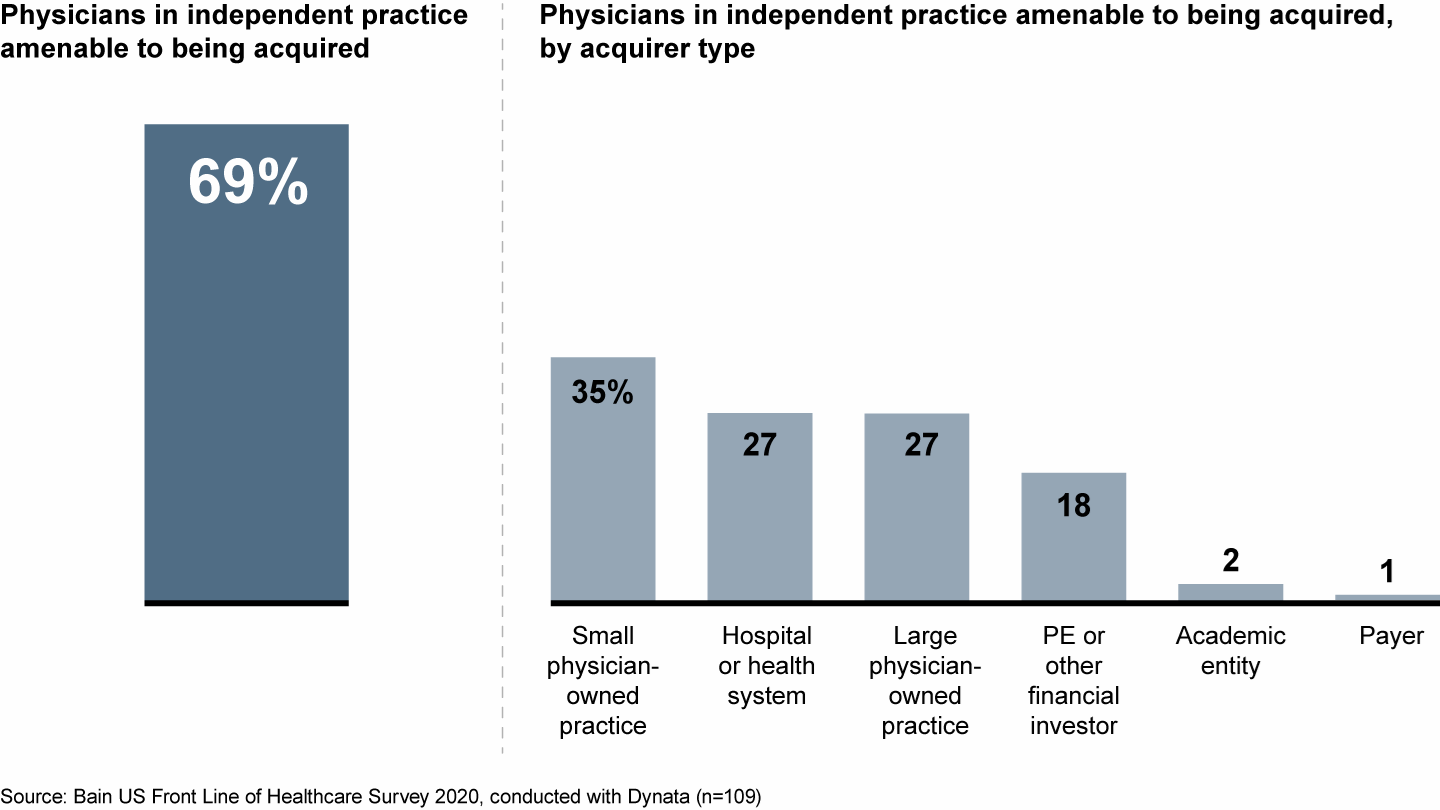Brief

Резюме
- Fifty percent of hospital administrators say their organizations are highly likely to make one or more acquisitions in the next two years, Bain & Company research shows.
- Nearly 70% of independent physician practices are amenable to a merger or acquisition.
- Physicians favor acquisition by organizations that would provide financial stability and but still offer physician autonomy.
This article is part of Bain's report US Healthcare Trends 2020: Insights from the Front Line. Explore more insights from the report here.
Providers have been consolidating over the last decade as organizations pursue economies of scale and expand vertically and horizontally. Post–Covid-19, we expect that larger healthcare groups and investors will accelerate their acquisitions of smaller hospitals, physician practices and alternative sites of care.
Strained finances and a sharp drop in procedure volumes have pushed organizations hard hit by the pandemic to entertain acquisition offers. Bain’s 2020 US Front Line of Healthcare Survey showed 70% of physicians in independent practices were amenable to acquisition (see Figure 1). The findings were consistent across surgical specialties (74%), primary care physicians (69%) and other office-based practices (67%). Both surgeons and office-based physicians were willing to consider an acquisition.
Nearly 70% of independent physician practices are open to mergers and acquisitions


In 2019, 30% of physicians who owned practices reported that they would sell their practice in the next two years, according to Bain research. Today, physicians favor acquisition by organizations that would provide increased financial stability but still offer physician autonomy, namely by other physician practices. Nearly 30% of respondents were open to acquisition by a health system, and nearly 20% said they would agree to a private equity buyout.
As acquisitions pool physicians in larger groups, provider organizations will need to be mindful of professional satisfaction. That’s particularly important when management-led organizations acquire independent physician-led practices. Although management-led groups offer economic security, physician-led groups enjoy a Net Promoter Score℠ that is 40 points higher, according to our research.
Large healthcare organizations, including hospital groups, expect to do more mergers and acquisitions. Fifty percent of hospital administrators said their organizations were highly likely to make one or more acquisitions over the next two years to pursue greater scale. Administrators considering M&A were most interested in alternative care sites, including ambulatory surgery centers, urgent care clinics and pharmacy in-store clinics. The next most popular target was independent physician practices, followed by standalone hospitals. Home health businesses that provide care services in the home have continued to gain market share over the last few years, fueled by lower costs and patient convenience, and investors have taken advantage of this trend.
As healthcare providers consolidate, they are likely to invest in digital capabilities. That move is increasingly important as digital natives like Amazon and Google enter the fray. Leading providers are building digital capabilities, such as apps to message directly with patients, that enhance care delivery and strengthen patient loyalty. One large US provider group generated big returns by investing in a secure doctor-to-doctor messaging platform and integrated patient portal that allows physicians across the country to share records in real time. Several years after launch, 70% of members are registered for the patient portal, leading to greater medication adherence and improved patient outcomes. Member loyalty is three times higher for users of the group’s digital tools.
Consolidation is likely to pick up in medtech, too. As provider systems consolidate vendors, medtech companies with category leadership positions will be in the best position to win in the ensuing flight to quality. Well-capitalized, larger medtech companies will be able to invest through the downturn to gain market share through organic and inorganic growth as demand returns.
Historically, M&A has been a critical part of a winning response to a crisis. Companies that made frequent acquisitions over the 10-year period from 2007 to 2017—through the financial crisis and beyond—had on average 27% higher total shareholder returns than companies that made infrequent acquisitions, Bain analysis shows. Healthcare companies initiated several industry-defining deals during and after the last downturn, including Roche’s acquisition of Genentech and Optum’s purchase of Alere Health, Catamaran Corporation and DaVita Medical Group.
Both healthcare companies and outside investors have long sought to use vertical integration and horizontal expansion to better manage patient outcomes and financial risk. Sophisticated acquirers are evolving the way they structure deals, balancing cash and risk sharing. That approach, coupled with attractive valuations, is likely to make the next two to five years an active period for healthcare M&A.
Net Promoter®, NPS®, and the NPS-related emoticons are registered trademarks of Bain & Company, Inc., Satmetrix Systems, Inc., and Fred Reichheld. Net Promoter Score℠ and Net Promoter System℠ are service marks of Bain & Company, Inc., Satmetrix Systems, Inc., and Fred Reichheld.

Insights from the Front Line
From physician burnout to telehealth, the pandemic has reshaped the healthcare landscape. Bain's series, US Healthcare Trends 2022: Insights from the Front Line, examines how the industry is confronting current challenges, including patient and physician satisfaction, the transition to value-based care, and omnichannel care.